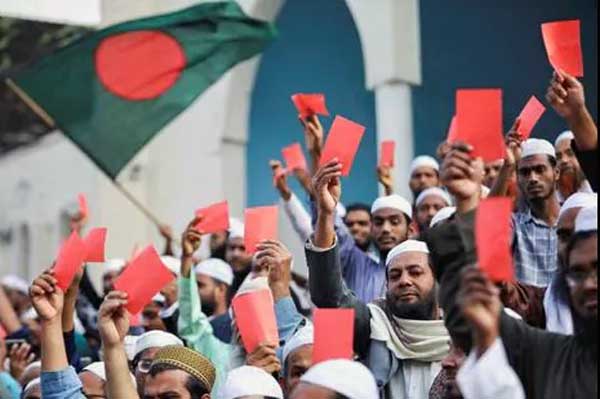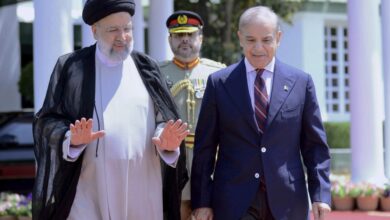After Maldives, Anti India Campaign Grows Momentum In Bangladesh, ‘Burn Your Wives Indian Sarees’; Whats Behind The Latest Twist In Bangladesh India Relations
Following a pattern reminiscent of recent regional tensions, Bangladesh is experiencing a surge in anti-India sentiments. The escalation in rhetoric, spearheaded by the opposition Bangladesh Nationalist Party (BNP), has drawn parallels to recent diplomatic disputes between India and the Maldives. But what has fuelled this campaign against India, and how is India seeing these latest developments?

Following the footsteps of the Maldives, Bangladesh is witnessing a surge in an anti India campaign.
Notably, the recent focal point of contention is targeted towards Indian sarees, with the opposition party, Bangladesh Nationalist Party (BNP), making it a political issue, declaring intentions to burn their wives’ Indian sarees, sparking a heated debate over Bangladesh-India relations.
Bangladesh Prime Minister Sheikh Hasina criticized the BNP for politicizing sarees, a traditional Indian attire.
The opposition’s stance can be seen pouring out on social media as hashtags like #IndiaOut and #BoycottIndia gained traction, drawing backlash from India. The BNP’s campaign spawned similar hashtags such as #BoycottIndianProducts.

The PM’s Stance, Politics At Play
Despite the controversy, Hasina stood by India, questioning the BNP’s ability to function without Indian spices and challenging the sincerity of their boycott.
She questioned the BNP leaders advocating for boycotts, especially regarding their wives’ possession of Indian sarees, suggesting they should burn those sarees if they are committed to the cause.
The rivalry between Bangladesh’s ruling party, Awami League, led by Hasina, and the opposition party, particularly the BNP, often centers around their respective relations with India.
The tension escalated when BNP leader Ruhul Kabir Rizvi symbolically discarded an Indian shawl and endorsed the social media movement to boycott Indian products.
Rizvi countered Hasina’s remarks by asserting that BNP leaders generally do not purchase Indian sarees, citing a personal incident involving a gifted Indian saree to his wife during a past visit to India.
In a separate incident, a senior joint secretary general of the BNP also asserted that Prime Minister Hasina must cater to the demands of neighbouring nations. Yet, she refrains from voicing dissent against India.
The BNP consistently directs criticism towards India.
In January, the BNP’s media cell alleged that “Bangladesh has borne the brunt of political repercussions due to the misguided policies of the Indian government.”
Citing the contents of a YouTube video, the party’s media platform further accused India of overtly meddling in Bangladeshi elections over the past 15 years; following Hasina’s victory in January’s election, which the BNP deemed unfair, they contested its legitimacy.

The Relations
India and Bangladesh share a historical bond, with India being the first country to recognize Bangladesh as a separate and sovereign state; also, the relationship transcends mere strategic alliances, rooted deeply in linguistic and cultural similarities.
Bilateral engagements surged in 2023, highlighted by the joint inauguration of the India-Bangladesh Friendship Pipeline by both prime ministers on March 18, conducted virtually.
Earlier this year, Bangladesh Prime Minister Sheikh Hasina secured her fourth consecutive term in office, with her Awami League party clinching three-quarters of parliamentary seats.
However, the election faced scrutiny from some quarters due to the detention of numerous top opposition leaders and activists on various charges—perceived by independent observers as politically motivated.
Despite the controversies surrounding the election, India, Bangladesh’s neighbor, welcomed the outcome.
Indian Prime Minister Narendra Modi extended congratulations to Sheikh Hasina, emphasizing India’s commitment to strengthening their enduring partnership.
India and Bangladesh share a 4,100-kilometer-long border, with bilateral trade surpassing $15 billion in 2021-22.

Why ‘India out’ Campaign Is Gains Momentum
Following the January elections, a coalition of Bangladeshi influencers and political activists initiated an “India out” campaign.
They contend that the Modi government not only overlooks Bangladesh’s democratic regressions but also actively supports Sheikh Hasina’s tenure to serve its own interests.
Despite the fervour of the campaign, scepticism looms large over its potential effectiveness due to the deeply entrenched relationship between the two nations.
Bangladesh’s significant reliance on India makes achieving a complete boycott improbable.
Ali Riaz, a political science professor at Illinois State University, perceives a deeper political message behind the campaign, suggesting ramifications beyond immediate outcomes.
He notes, “The campaign mirrors the underlying discontent regarding India’s neglect of Bangladesh’s legitimate grievances and its involvement in domestic politics.”
Riaz points to the belief that India has aided Sheikh Hasina’s prolonged tenure despite democratic setbacks and human rights issues, which Western nations have condemned. He cites instances from previous elections where India allegedly supported Hasina amidst accusations of electoral fraud and boycotts.
Contrary to these allegations, the Bangladeshi government refutes claims of Indian interference.
Mohammad A. Arafat, a lawmaker from Bangladesh’s ruling Awami League, dismisses the ‘India out’ campaign, emphasizing the lack of necessity in addressing it.
Arafat instead points out US interference in Bangladeshi affairs, citing visa restrictions imposed on citizens undermining elections.
Although the US criticized Bangladesh’s January general election for lacking fairness, it refrained from imposing new punitive measures.
Bhattacharya and Riaz argue that New Delhi utilized its diplomatic influence to dissuade stricter US action against Bangladesh concerning democracy and human rights issues.
However, Washington denies any allegations of meddling in Bangladesh’s internal politics.

How does India perceive the campaign?
Bangladesh’s anti-India campaign follows Maldives President Mohamed Muizzu’s pledge to distance his nation from India in a region where New Delhi and Beijing vie for influence.
Muizzu, while serving as an opposition leader, called for the removal of Indian military personnel stationed in certain Maldivian islands.
Still, it is estimated that around 75 Indian military personnel are present in the Maldives, engaged in activities such as transporting patients from remote islands and conducting sea rescues.
India’s External Affairs Minister S Jaishankar expressed nonchalance towards the “India out” campaigns.
Addressing an event in Mumbai on January 30, Jaishankar emphasized the need to acknowledge two realities – he noted that China, as a neighboring country, also holds significant influence in the region and competes with India for geopolitical leverage, particularly in nations like the Maldives, Sri Lanka, and Bangladesh.
Shantanu Mukherjee, a former officer of the Indian Police Service (IPS) and an expert on Bangladesh based in New Delhi, acknowledges the presence of “anti-India forces” within Bangladesh, albeit in small numbers.
Mukherjee claims that these dissenters constitute a minority within Bangladesh and are opposed to fostering closer ties between Bangladesh and India, arguing that these anti-India sentiments may intensify further as bilateral relations strengthen.






